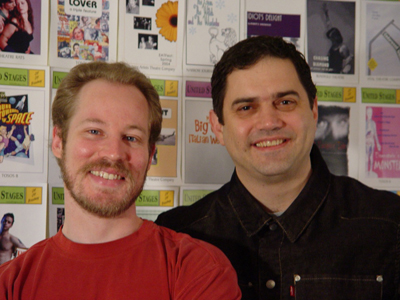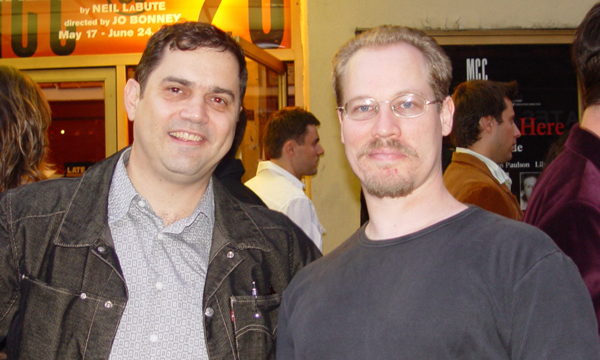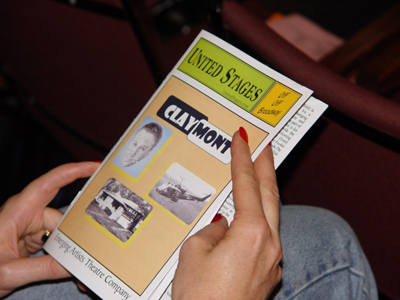

PopEntertainment.com > Feature Interviews
- Theater > United Stages
 United Stages
United Stages
Off Broadway
by Ronald Sklar
Copyright ©2005
PopEntertainment.com. All rights reserved.
Posted:
September 18, 2005.
The New York small-venue
theater scene is -- as it has always been -- vibrant with new and even
established talent – both on and off the stage. However, small venue – or as
it is sometimes called, off-off Broadway – is an artistic endeavor that
faces many challenges and not many solutions. Since Shakespeare’s day, it’s
the same olde story: the drive and the talent are there, for sure; the money
is not.
Small venue is not exactly
an idealistic dream world – it is immersed in cold, hard reality. The lack
of funds as well as the time crunch suffered by producers, directors and
actors have kept many a fabulous production from making their mark on a
generally indifferent world. In addition, the burdens faced by small venues
for the usually short duration of their shows are often overwhelming.
Enter United Stages. This
enterprising New-York-based company seeks to relieve small-venue producers
of their general business load so that they can be free to create, perform
and deliver. This includes producing playbills,
cross-promoting events, even publishing plays – at a comfortably reasonable
cost.
Founded by playwright
Jonathan Reuning and director Ian Marshall, United Stages is growing a
healthy list of exciting new theater companies as their regular clients.
With certain business responsibilities relieved by United Stages, the world
of small-venue seems to be rejuvenating – which is a source of pride for the
company and an integral part of its mission statement.
Here, Reuning and Marshall
discuss their goals, challenges and the current state of New York small
venue theater:
What is the purpose
of United Stages?
Ian: It’s really
summed up in our name. There is so much performance going on in New York
City, beyond Broadway, beyond opera, beyond $120 tickets, that for most New
Yorkers, this is what theater is really about: it’s edgy, it’s new. Our
motto is “see more shows.” We want to get more people there. We want to
encourage production at this level and make it a destination point for
tourism.
Jonathan: New York
is obviously the theatre capital of the world. A small venue having a
playbill brings that small venue to life. It’s all about making the less
visible visible.
 What distinguishes
small venue in New York?
What distinguishes
small venue in New York?
Jonathan: This is
different from Broadway or even off-Broadway. This is a form of intimacy.
This is what radio used to be. This is not just a poor man’s Broadway, but
something that is unique to New York. If there is one thing we want to do,
it is to get people to be in an environment in which they can experience
theater close up and really learn how special it is.
Ian: Imagine a
script that is not commercial, without a chance that it’s going to go to
Broadway or off-Broadway, where the expenses to watch such a production are
astronomical. As good as this script is, it has a life somewhere, and it
will not be in those high-profile destinations. It will be in a small venue
performance.
Jonathan: The
Flid Show is a great example. The depth of the show is unfathomable, and
it’s mind-blowing. Yet only a few hundred people saw it.
How did the idea of
United Stages originally occur to you?
Jonathan: It was
like an evolution. We asked ourselves, what do we have to do to make people
remember our show? These shows are usually gone in two weeks. You can’t get
a grant for this kind of thing. There is nothing dependable about it.
However, we’ll always be able to do this if there is a need. From the kid
who just got off the bus to the professional who has been acting for fifty
years, all are seen in these small venues. There is a wide variety of talent
here.
How did your
backgrounds prepare you for this venture?
Ian: I guess I
always knew I wanted to be an actor. I came to New York and trained. Then I
realized that acting was not really my ultimate destination. I’m a teacher.
I teach movement and stage combat at a number of schools. And I direct. And
each time, after the performance was over, there was a feeling of emptiness.
So the idea of publishing the scripts and having a professional program that
was very real helped to ease the blow that we are not allowed to continue
these performances perpetually.
Jonathan: I went to
NYU and I felt for sure I wanted to be an actor. Then, the second I
graduated I realized that I hated going on auditions and I hated being “on.”
I took a great playwriting class in acting school and all the lights turned
on in my head. I was in television when I was young and I was doing
“actorly” things, and so I thought it was to be my destiny. Yet getting my
first play produced was the hardest thing I’ve ever done in my life. It was
just really hard – as it should be. After my first play was produced, I was
invited to join a company and become a manager and I was introduced to all
these business aspects that challenged me not just as a writer but as a
producer.
Ian: If I had known
then what I know now, I probably would have minored in business. And that’s
what many actors who go to acting school are lacking – a business sense.
They are their own product. They must be able to market themselves. I tell
all my students, “At this level, you are going to perform in work you create
for yourself." You really have to create your own work. One of the directions
that United Stages is definitely headed is to help stimulate production of
this level of performance. This is so that it’s not such a chore for people
to produce something that they feel passionate about.
Jonathan: It
stimulates work going on in New York, and hence, globally, because New York
is the world capital of theater. Doing this is like planting seeds.
 What are the
challenges you see in establishing a business such as this one?
What are the
challenges you see in establishing a business such as this one?
Ian: What are we up
against? There are a lot of production companies out there and there are a
lot more that get started every single day. Nobody has any money at this
level. And that’s okay. But a lot of people want to do things cheaper. So
the challenge is to bring a lot more people on board to advance the
movement.
Jonathan: That is
our biggest challenge – how to make this really cheap so that everyone can
have it, and yet somehow make a living from it. The other challenge is
helping people to rise to a level of professionalism that says, “I’m worth
seeing.” To get maybe ten more people in the seats and to open up a dialogue
with each other. I would love to create a pub society like England has where
there is actually a place to go after a show and you can talk with someone
about it. A community. There are a lot of empty pubs, and a neighborhood
theater company can create a relationship with the pubs that happens
naturally. There are many pubs that are within walking distance of maybe six
to ten shows every night.
Do production
companies have to be schooled in the ways of marketing?
Ian: I think there
is a certain mentality among many production companies that small means
“under the radar.” It doesn’t have to be. And it doesn’t take a huge amount
of work. What it does take is a community that helps support their
visibility. When this happens, small venue becomes a destination. It then
rises above and becomes something else, which is amazing, vibrant
performance in New York City. This is not to be confused with Community
Theater in other places outside of New York, which is a group of talented
amateurs performing for recreation. Not to put that down at all, because I
grew up in a community theater as well. This is different. These are
professionals. Maybe they haven’t broken through to Broadway yet, but some
of them have. Between gigs, Broadway actors perform here.
Jonathan: We have a
column in our playbill called Seeing Stars. What we’re saying here is that
there are stars here right now in this venue that we think aren’t just
aspiring – they’re already there! That’s what spotlighting can do for an
actor. We’re saying, “You’re not going to see an actor better than this
guy.”
Compared to
Broadway, are artists in small venues more passionate?
Ian: I can’t say
that people on Broadway are not passionate. However, whenever you have
millions of dollars at stake, then everybody’s going to have their say, and
that requires a lot of compromise. Things that perhaps were once edgy or
controversial or awe-inspiring may have been dulled down for a lower common
denominator. You don’t have that problem in small venue. There aren’t
millions of dollars at stake.
Jonathan: There is
not as much self-censorship because there is not as much at stake. Small
venue isn’t as self-conscious.
 What needs to
change?
What needs to
change?
Ian: Space
availability. Jonathan and I have both produced theater before, and by far
the largest expense at this level is space. Space is tremendously expensive.
We’re also losing lots of really great theater spaces all over the city. The
leases are being bought out by companies that want to turn them into condos
or whatever because they make more money from it. From a financial point of
view, theaters don’t bring in a lot of income, so people who own the
buildings are pretty much seeing small venues as a charity. However, the
owners have to charge a lot of money to justify the cost. That cost gets
passed on to small venue producers.
Jonathan: It’s
survival of the fittest right now. Some companies are being very clever now
by pairing up with other companies and making alliances and doing shows at
off hours or staggered hours. That’s why every pub should have a theater
space. Places that are dead at night -- like in the financial district –
should open up their doors. This is a perfect place for small venue. So it
would work both commercially and communally.
What keeps artists
in this world going?
Jonathan: On a
personal level, you make a choice about what your life is going to be like
as an artist. You decide, well, maybe I’m not going to be doing commercials.
Instead, maybe I’m going to lead this life that a lot of people choose to
live, that is a full, complete artistically wonderful life. Making a living
from this is not the primary thing. Love what you’re doing. Have a passion
for what you’re doing.
For more information
about United Stages services, or to connect with the vibrant world of small-venue theater in New York City, log onto
www.unitedstages.com.
Email
us Let us know what you
think.
Features
Return to the features page
